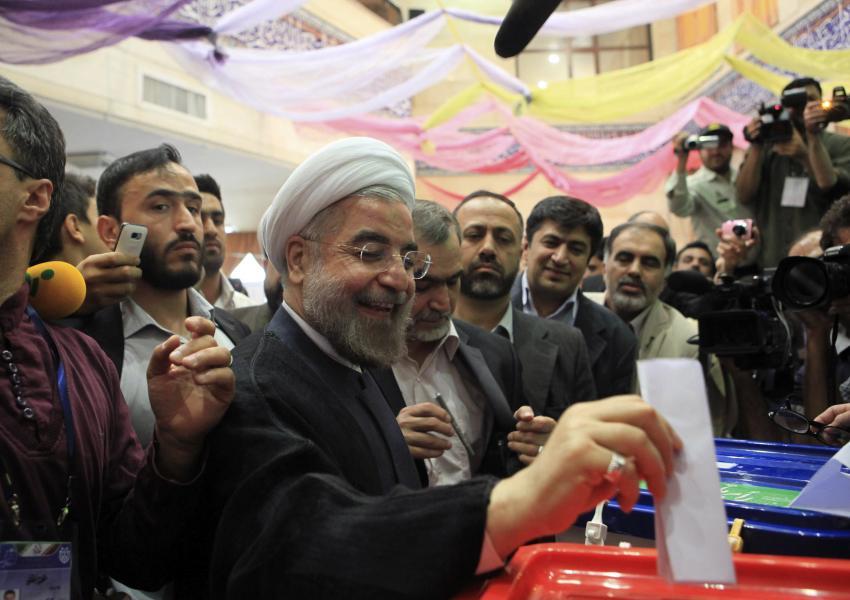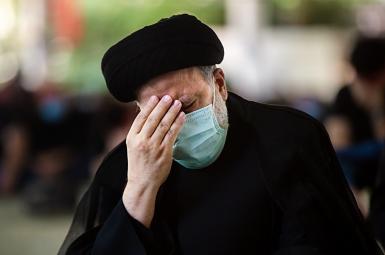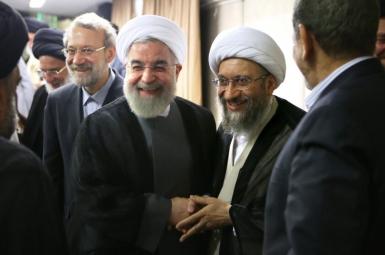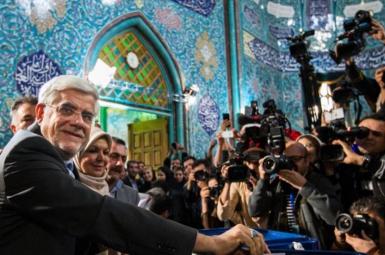
Presidential Candidates Seize On Discontent In Iran, Lash Out At Easy Targets
Second tier political figures who have nominated themselves to run in the Iranian presidential election in June have started the campaign with criticism of the current political and economic situation. At the same time, Iran's state television has launched an election program whose main theme is criticizing the performance of President Hassan Rouhani and Foreign Minister Mohammad Javad Zarif.
It appears that the hard core of the regime is seizing the opportunity of the election to put an end to moderate politicians' careers. Rouhani who is finishing his second term with no chance to run again is an easy target. No one would dare to directly criticize the Supreme Leader who wields real power.
In an interview with reformist daily newspaper Sharq on Tuesday April 20, Massoud Pezeshkian, a proreform member of parliament has revealed his intention to run. His first step, however, has been lashing out at the country's health and medical system.
Pezeshkian, a medical doctor and a former health minister, said the injustice in the public health and medical treatment system has led to the death of many Iranians who lack the necessary resources and connections to benefit from the system.
He also criticized the fact that presidents do not have sufficient powers to run the affairs of the state, but he did not say why he is trying to occupy a position in which he cannot exercise his full authority.
Pezeshkian complained that the current political situation does not encourage individuals to run for President. "We are moving toward a unilateral governance that does not allow criticism," he said, adding that "the resulting political deadlock is danger for the country."
President Hassan Rouhani and others have complained in recent years that Supreme Leader Ali Khamenei and his supporters have in practice limited the president’s authority and freedom of action.
"We should allow for various ideas to be presented and the people should not be afraid of voicing their true demands," Pezeshkian said as if he was describing the very political impasse that has made the Presidential election so lacklustre that even candidates such as himself complain about the non-competitive political atmosphere.
Pezeshkian also complained about the electoral system that disqualifies large number of reformists in every election.
Another Presidential candidate, former oil and communication minister Mohammad Gharazi also criticized the country's situation in another interview while announcing his candidacy and introducing his platform. His interview which originally appeared in the IRGC-linked Tasnim news agency was widely published by other media outlets.
Gharazi, 80, one of the oldest individuals to step forward as presidential candidates, ran for president twice before with no luck. He harshly criticized Rouhani and his administration for the Iranian currency losing most of its value and lashed out at Rouhani as "a man who has no credibility".
On the other hand, both candidates, Pezeshkian from the left of the center, and Gharazi, a right of the center politician strongly denied their affiliation with any political party. Both of them presented themselves as independent candidates, knowing that ruling factions have all lost a lot of public trust.
In the meantime, starting from the second week of April, Channel 1 of Iran's state-run national television has started a program, airing three times a week, discussing issues related to the upcoming election. The program "Sorraya" [The Sky] harshly criticizes President Rouhani and his Foreign Minister Javad Zarif and blames them for every single problem in the country.
The hardline core of the regime is probably trying to make sure that Rouhani's career is over once he leaves the presidential palace in early August, no matter who replaces him.







